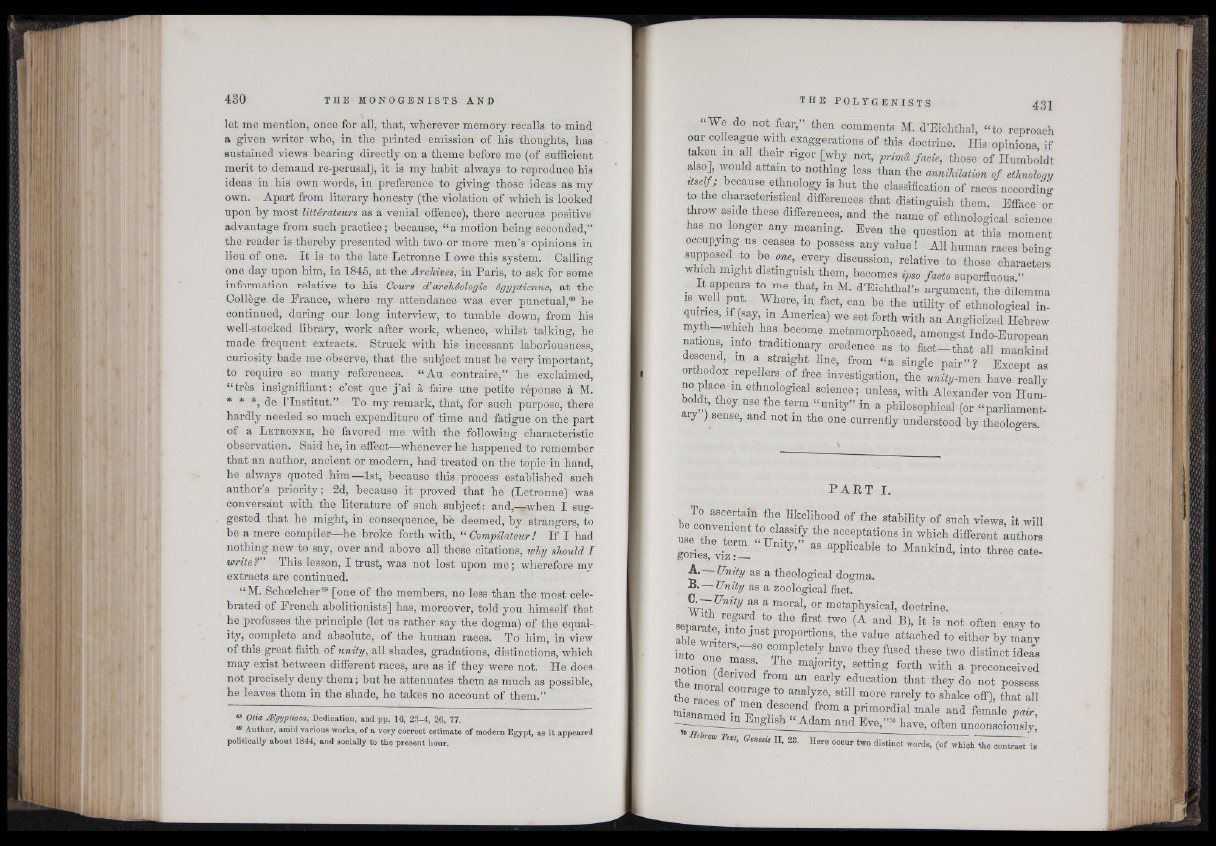
let me mention, onee for all, that, wherever memory recalls to mind
a given writer who, in the printed emission of his thoughts, has
sustained views bearing directly on a theme before me (of sufficient
merit to demand re-perusal), it is my habit always to reproduce his
ideas in his own words, in preference to giving those ideas as my
own. Apart from literary honesty (the violation of which is looked
upon by most littérateurs as a venial offence), there accrues positive
advantage from such practice; because, “ a motion being seconded,”
the reader is thereby presented with two or more men’s opinions in
lieu of one. It is to the late Letronne I owe this system. Calling
one day upon him, in 1845, at the Archives, in Paris, to ask for some
information relative to his Cours d’archéologie égyptienne, at the
Collège de France, where my attendance was ever punctual,® he
continued, during our long interview, to tumble down, from his
well-stocked library, work after work, whence, whilst talking, he
made frequent extracts. Struck with his incessant laboriousness,
curiosity bade me observe, that the subject must be very important,
to require so many references. “Au contraire,” he exclaimed,
“ très insignifiiant: c’est que j ’ai à faire une petite réponse à M.
* * *, de l’Institut.” To my remark, that, for such purpose, there
hardly needed so much expenditure of time and fatigue on the part
of a L e tro n n e , he favored me with the following characteristic
observation. Said he, in effect—whenever he happened to remember
that an author, ancient or modern, had treated on the topic in hand,
he always quoted him—1st, because this process established such
author s priority ; 2d, because it proved that he (Letronne) was
conversant with the literature of such subjecf: and—when I suggested
that he might, in consequence, be deemed, by strangers, to
be a mere compiler—he broke forth with, “ Compilateur! If I had
nothing new to say, over and above all these citations, why should I
write?" This lesson, I trust, was not lost upon me; wherefore my
extracts are continued.
“M. Schoelcher69 [one of the members, no less than the most celebrated
of French abolitionists] has, moreover, told you himself that
he professes the principle (let us rather say the dogma) of the equal-
itv, complete and absolute, of the human races. To him, in view
of this great faith of unity, all shades, gradations, distinctions, which
may exist between different races, are as if they were not. He does
not precisely deny them ; but he attenuates them as much as possible,
he leaves them in the shade, he takes no account of them.”
Olia Ægyptiaca, Dedication, and pp. 16, 23-4, 26, 77.
68 Author, amid various works, of a very correct estimate of modern Egypt, as it appeared
politically about 1844, and socially to the present hour.
--------------------------------------UOl
“We do not fear,” then comments M. d’Eichthal, “to reproach
our colleague with exaggerations of this doctrine. His opinions, if
taken m all their rigor [why not, primd facie, those of Humboldt
also], would attain to nothing less than the annihilation of ethnology
.se lf; because ethnology is but the classification of races according
to the charactenstieal differences that distinguish them. Efface or
dirow aside these differences, and the name of ethnological science
has no longer any meaning. Even the question at this moment
occupying us ceases to possess any value! All human races being
supposed to be one, every discussion, relative to those character
which might distinguish them, becomes ipso facto superfluous.”
I H R H I ^ in M- d’Eichthal’8 argument, the dilemma
I m e Ar6’ 111 fact> °an he the utility of ethnological in-
W m m - t menca) we set forth with an Anglicized Hebrew
y h which has become metamorphosed, amongst Indo-European
nations into traditionary credence as to fact—that all mankind
descend, m a straight line, from “ a single pair” ? Except as
noffifc°eX-rePtile^ °f f i6e inves%ation, the unity-mzn have really ■Ml n SCienCe; Unless’ with I B Alexander von Hum- U S e .t h e Jerm “unity” in a philosophical (or “parliament-
ry ) sense, and not in the one currently understood by theologers.
be'eo asce,foafo likelihood of the stability of such views, it will
use tCTer™ 1 5 tte aceeptations in which different authors
gories, viz-— ' ’ aS aPPllcable to Mankind, into three cate-
A- Unity as a theological dogma.
Unity as a zoological fact.
C. — Umty as a moral, or metaphysical, doctrine.
separate 1 1 1 1 8 I S ■ (A and B)’ ¥ is not « ^ n easy to
able write ProP°rtions, the value attached to either by many
■ K B I S H the«, two distinct
notionTderia8J f maj°rit^ setting forth with a preconceived
the moral ™ T M l education that they do not possess
the races of agV ° S 3 S m°re rarely to shake off)> that all
misnamed i S BESS from a primordial male and female pair,
^ j g g e d in English “ Adam and Eve,”" have, often unconsciously,
mweu, Text, Oenesu II, 23. Here occur two distinct words, (of which’the contrast is